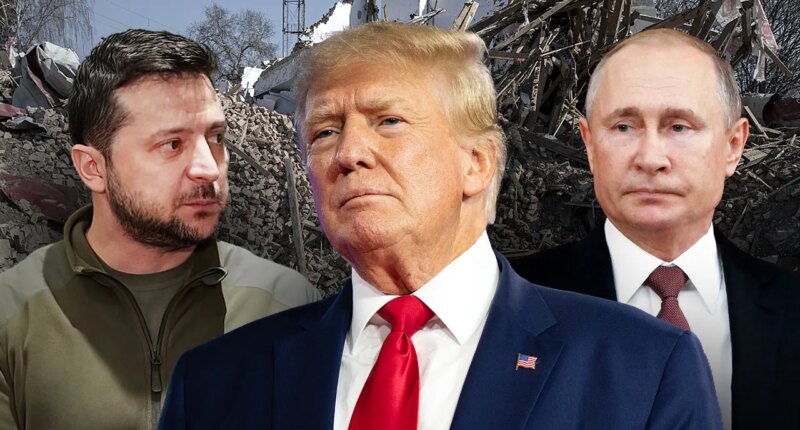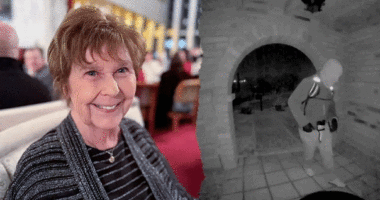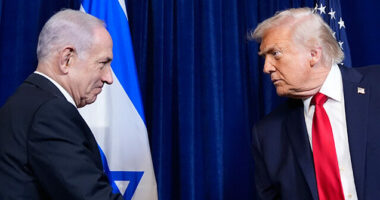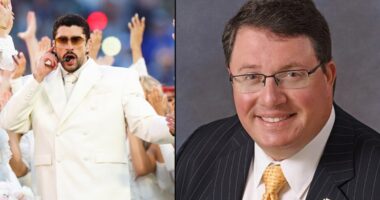Share this @internewscast.com
The United States has unveiled a revamped peace initiative aimed at resolving the ongoing conflict in Ukraine. According to officials and experts from Kyiv, Moscow, and Washington, this effort is closer to achieving a breakthrough than at any time since the Russian invasion began. However, progress remains hindered by a significant roadblock: Russia’s demand for Ukrainian territory, which Ukraine steadfastly refuses to concede.
In a recent statement, former President Donald Trump highlighted “tremendous progress” in the peace talks. He announced that his special envoy, Steve Witkoff, is scheduled to meet with Russian officials in Moscow, while senior U.S. defense leaders engage in discussions with their Ukrainian counterparts. A senior American official confirmed to Fox News Digital that Kyiv has accepted the general principles of the proposed agreement, with only “minor details” left to negotiate. Meanwhile, European allies are forming a new “Coalition of the Willing,” with France advocating for a “just and lasting peace.”
Despite these diplomatic efforts, Russia’s renewed missile and drone attacks on Kyiv, resulting in civilian casualties and damage to power infrastructure, underscore the persistent territorial disputes that remain a contentious issue in the negotiations.
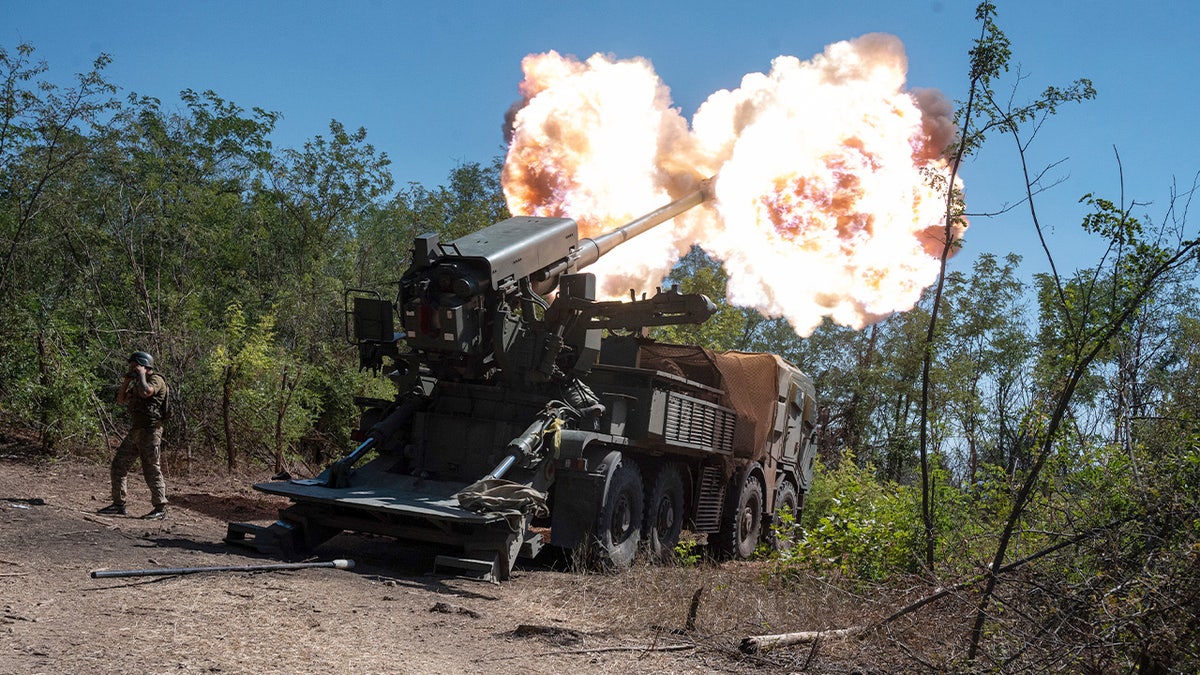
Oleksii Honcharenko, an opposition member of Ukraine’s Parliament, expressed urgency in pursuing peace, despite skepticism within Ukrainian society regarding the proposed plan. “My personal position is that we need peace as soon as possible,” he stated. “This plan is a chance. I don’t like everything in it… some things are unacceptable. But it is a workable framework.”
Honcharenko also countered criticisms labeling the peace proposal as a U.S.-Russia scheme imposed on Ukraine. “For me, it doesn’t matter who the initial author was. There is a framework. Let’s work on it,” he emphasized.
He pushed back on criticism that the “peace proposal” is a U.S.-Russia blueprint imposed on Kyiv. “For me, it doesn’t matter who the initial author was. There is a framework. Let’s work on it.”
Honcharenko acknowledged that sanctions relief — one of Russia’s core demands — would be painful for Ukrainians. But he also underscored the reality of the battlefield: “We are not in the position where our tanks are near Moscow. There will not be a solution I like completely.”
Rep. Andy Barr, R-Ky., a House Foreign Affairs committee member, told Fox News Digital the situation reinforces the need for strong American leadership. “Russia invaded Ukraine because Joe Biden was the weakest president in American history.”
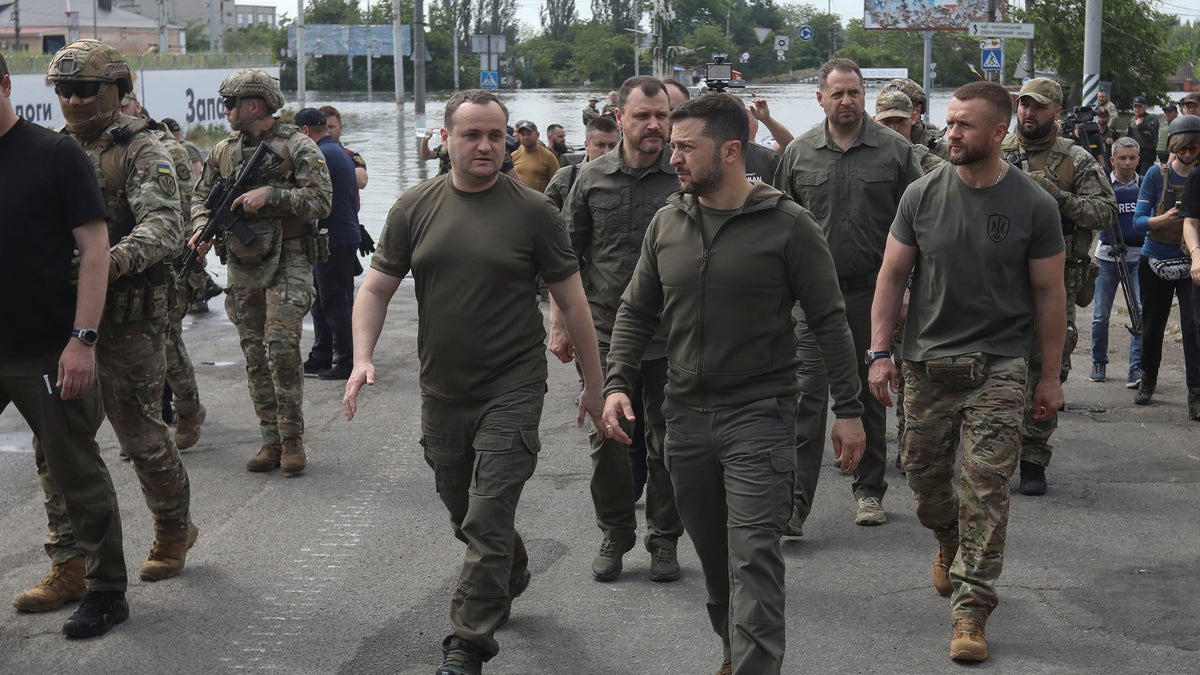
President Volodymyr Zelenskyy visits a flooded area after the Nova Kakhovka dam breached, in Kherson, Ukraine June 8, 2023. (Reuters/Stringer)
Barr, a candidate for U.S. Senate in Kentucky said, “President Trump’s peace-through-strength leadership kept Putin fully contained. This war never would have happened under his watch. Trump is the peace president… the only leader who can end this war and bring stability back to Europe.”
Exiled Russian economist and former deputy finance minister Sergey Aleksashenko echoed the main roadblock: “The biggest difference is territorial,” he told Fox News Digital. “Russia wants to grab what it was not able to take by military means. Ukraine does not want to give up. All other points could be resolved, but not territory.”
He said he sees no sign that Russian President Vladimir Putin is prepared to compromise, arguing the Kremlin believes Western support for Ukraine is weakening. Putin may be willing to fight “another two, three years,” convinced he can outlast Kyiv and European governments struggling to maintain military aid.
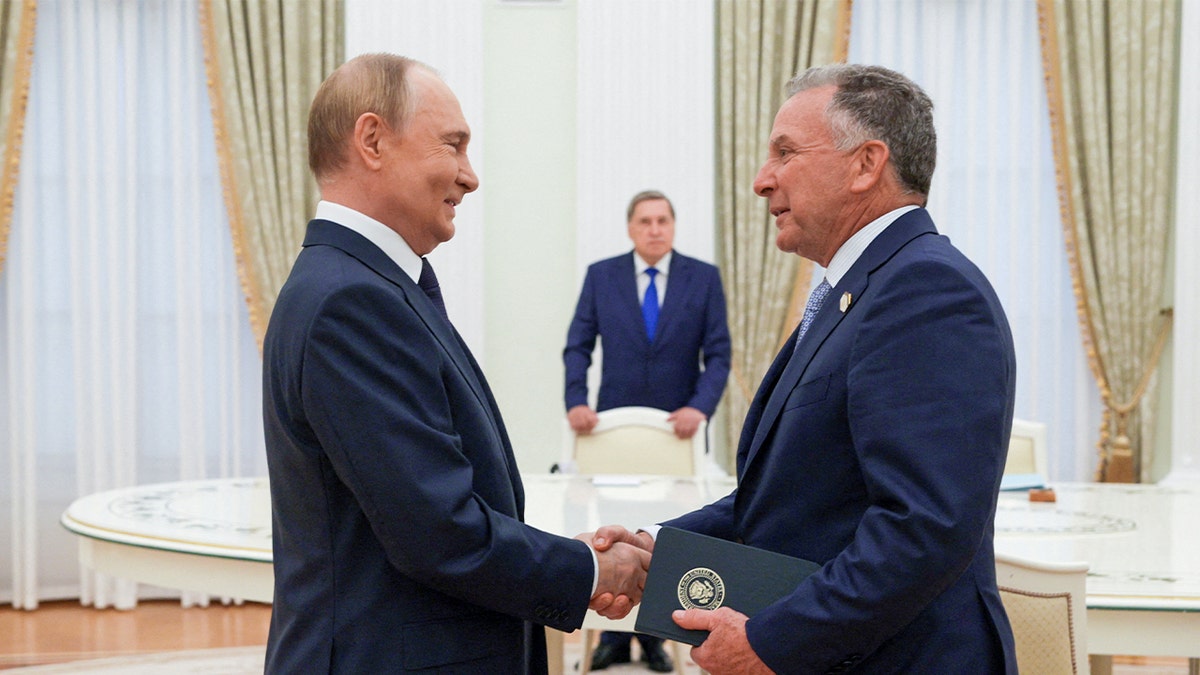
Russian President Vladimir Putin welcomes President Donald Trump’s envoy Steve Witkoff during a meeting in Moscow, Aug. 6, 2025. (Sputnik/Gavriil Grigorov/Pool via Reuters)
Retired Gen. Philip Breedlove, the former NATO supreme allied commander, told Fox News Digital he doesn’t see Ukraine agreeing to give Russia land Russia has never conquered. “It is an incredibly, incredibly bad thought,” he said.
Breedlove argued that Putin’s goals extend far beyond Ukraine and that the Russian president has been clear about wanting to reshape the security order in Eastern Europe. He also warned that Ukrainian President Volodymyr Zelenskyy is negotiating under heavy pressure from Western governments that control Ukraine’s access to weapons and funding.
“It’s very clear he’s being threatened with no support,” Breedlove said. “If Mr. Zelenskyy loses the support of America and Europe, life’s going to be really ugly for Ukraine. But they will not stop fighting.”
He said early versions of the U.S. proposal included “egregious” provisions that Ukraine never would have agreed to, but that the process has “improved” as Kyiv’s input was incorporated. Still, “the things that are acceptable to Ukraine are not going to be acceptable to Mr. Putin,” he said.

Secretary of State Marco Rubio and others join the Ukrainian delegation before closed-door talks on ending Russia’s war in Ukraine, at the U.S. Mission in Geneva, Switzerland, Nov. 23, 2025. (Emma Farge/Reuters)
Breedlove pushed back on the claim that Kyiv is ready to concede territory, saying lawmakers want peace but not capitulation. “I believe there are many parliamentary hearings and many in Zelenskyy’s group that want peace, but they want a durable, equitable peace. I’m not sure that they’re ready to make a lot of concessions to do that,” he said.
As negotiators move toward what they hope will be a final round of talks, all sides agree on one point: the success or failure of this effort will depend on whether Ukraine and Russia — under pressure from allies, including incentives from Washington and the realities of the battlefield — can finally bridge the territorial divide that has defined the war from day one.
